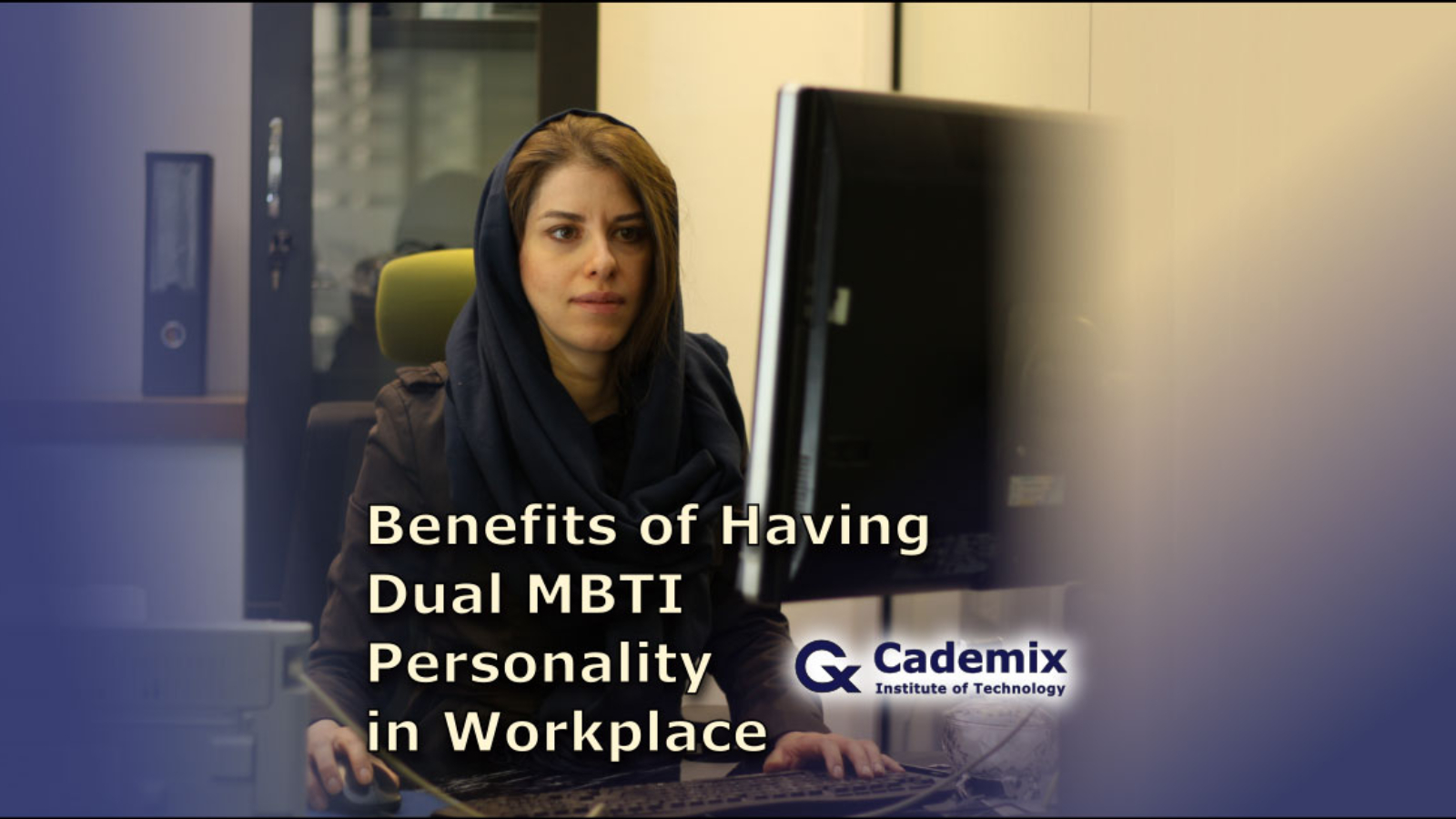In this article, we review the benefits of having a dual MBTI personality in the workplace. Further, describe the MBTI personality test in general, the benefits of the MBTI test in the workplace. after that, explain why organizations do need to use this test to reach their goals faster. In the end, we compare two different MBTI personality types and explain how a dual MBTI personality can help in the workplace.
By Samareh Ghaem Maghami, Cademix Institute of Technology
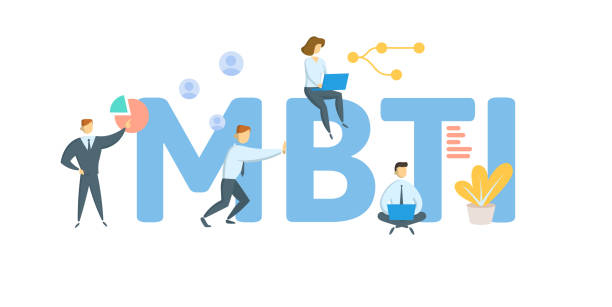
What is MBTI Personality Test?
Before we can even start to discuss the benefits of MBTI in the workplace, let’s describe what they are. According to Myers & Myers 1995 on Wikipedia, the Myers-Briggs type-indicator, or MBTI, is the world’s most commonly used personality inventory. The Myers-Briggs Type Indicator (MBTI) is a self-report questionnaire that identifies different psychological tendencies in how people view the world and make decisions. Introversion or extraversion, sensing or intuition, thinking or feeling, judging or perceiving. Therefore these are the four categories that the test aims to assign. The test divides people into 16 different personality types. It contains four separate spectrums as we use four-letter test results, such as “INTJ” or “ESFP,” created by taking one letter from each group:
Introversion vs. Extraversion
The source of your energy is described in this section of the test. It means, yet many people mistake these terms to mean “shy” vs. “outgoing”. You are most likely an introvert if you get your energy from being alone and enjoy self-reflection. On the other hand, if a person feels more energized in a crowd is extraverted.
Sensing vs. Intuition
The “Sensors” personalities solve new problems with their habits. They prefer to choose “tried and true solutions” instead of trying something new. On the other hand, intuitive types of personalities, prefer to find just new ideas, possibilities and prefer theorizing rather than implementing.
Thinking vs. Feeling
Thinkers are more likely to have objective perspectives. As the result, they often evaluate questions, ideas, and solutions before embracing people without asking them. Also, they can develop discussions healthily and at the same time, consider them impersonal. On the other hand, feelers are more concerned with interpersonal harmony and the individuals involved than with the duty itself. They prefer to negotiate more and usually focus on similarities rather than differences.
Judging vs. Perceiving
For the judgers, it is very important to be in a position of an organization with the start and endpoint. closure and organization. For example, they prefer to work hard and then relax. Also, they are famous for managing time and expectations with lists and calendars. But, those who are perceived generally prefer spontaneity over formality. They enjoy coming up with fresh ideas and trying new possibilities!
Benefits of MBTI personality in Workplace
Approximately 90% of organizations use the MBTI test in the employment process or as a team-building exercise. And this data are based on statistics that give more than 3.5 million assessments each year. As we explain, this exam is important and allows organizations to gain a more in-depth understanding of their employees’ personality qualities. There are numerous advantages of using MBTI in the workplace, in brief.
1. It Eliminates Conflict
Knowing your MBTI personality types will help you figure out how to react to your coworkers in the most effective way possible, which is important. If you have a contrast whit one of your coworkers, you may have a greater chance of trying to resolve the situation, if you know how they deal with conflict and disagreements.
2. Make Communications Improves
One of the most remarkable benefits of the MBTI is that it promotes healthy workplace communication. For example, personality typing can help coworkers figure out how to approach peer-to-peer communication and bring value to manager-employee relationships. So you can have a better gauge of what each employee will require to do their jobs efficiently if you know how they work best.
3. May Improves Teamwork
You’ll notice that as you build your relationships and communication, your teamwork increases as well. The MBTI can reveal a lot about how your team members prefer to work and who they interact with it in a productive and efficient manner. It’s useful to have this knowledge when putting together a team because it helps to avoid conflict and match personalities that don’t clash. MBTI also allows managers to arrange individuals who can complement one another based on perceived strengths and limitations when forming teams.
4. Plays to Strengths
It’s important to play to people’s strengths and minimize the impact of their weaknesses. Hence why it’s crucial to have a deep understanding of your employees. That is to say, each MBTI type has its very own strengths and shortcomings and in knowing these, you can determine which roles to place your employees in. Knowing each employee’s personality type can remove any threat of misallocation in the workforce.
5. It Encourages Self-Reflection
It is critical to be self-aware. You’ll gain a greater understanding of yourself this way. The MBTI helps your staff to assess their emotions and consider how their brains function. This is critical in producing high-quality work, particularly in creative industries. This allows individuals to expect how they will react to the world and the people around them, as well as anticipate their own needs.
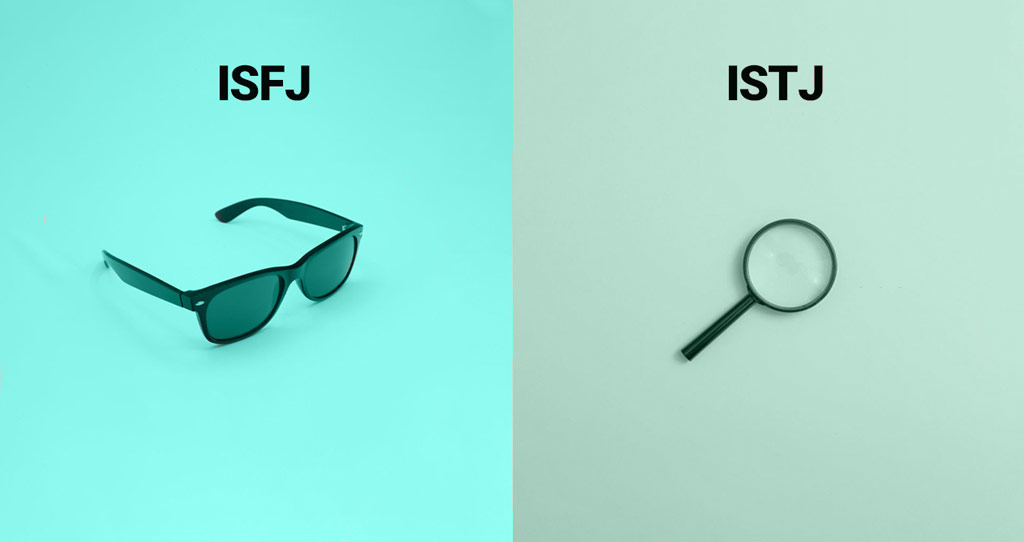
Why Do Businesses Require a mix of Personalities, Strengths, and Weaknesses?
Employees easily attract people who understand them more easily. In other word, workplaces, thrive on variety. Employees with a mix of talents and weaknesses can assist you to ensure that you deliver the finest work possible on every project.
Several Styles for Several Purposes
For human resources, a thorough planner could be great, while for research and development, imaginative personality is better. Those that enjoy chatting will appreciate working with conversational, friendly customer care agents. On the other hand customers in a rush may prefer more technically inclined employees.
Variety of Strengths
A weakness isn’t a weakness in all situations. As an example, when an employee is anxious, he/she may cry, but he/she may be extremely sympathetic to a customer who is having a horrible day. During stressful negotiation sessions, an aggressive employee who monopolizes conversations could be just what you need. You won’t be able to deal effectively with some problems if every employee has the same challenges. However, if each employee is dealing with her/his own problems, you’ll always have someone available who is capable of dealing with a fresh scenario.
Variety of weakness
We have no perfect person, no matter how hard they try to convince you otherwise during the interview. When you hire staff with similar personality type, you may find that your company keeps running into the same problems. If all of your staff are quite technical people who struggle with social relations, you may not have someone who can deal with irate customers or communicate new developments to the wider public. Instead, you’re essentially selecting workers with a variety of strengths by selecting employees with a variety of limitations.
The ISFJs and ISTJs Personality types Similarities
The ISFJs are devoted and dedicated to individuals and organizations, and they take their obligations extremely seriously. They are conscientious and diligent. They have a huge store of information and a phenomenal memory, which they employ to help people and solve issues. Mostly we know them as Defenders, as one of our team members mentioned in his articles about Roles of ISFJ and Defenders during Corona Pandemic .
On the other hand, generally, known them, Detective. The ISTJs are logical, detached, and detail-oriented people. Their values are responsibility, loyalty, and tradition. ISFJs are working methodically to complete the task once they understand what is required of them. They are risk-averse and favor the familiar, as well as facts above ideas.
The ISFJs and ISTJs prefer to stay out of the spotlight; typically the one who quietly makes it all happen and bring a project to successful completion.
Comparison of ISFJs and ISTJs – Dual MBTI personality in Workplace
We all bring something unique to the table, and we’ve all agreed that diversity and balance are beneficial. When someone is different from us, though, we may not comprehend them. As a result, we have created this part to help you get to know this type of personality better at work. How they manifest themselves, and how they act at their best. In the following text, we briefly describe how people with ISFJ and ISTJ personality types perform in the workplace. Also, with a little explanation, we conclude that these people, despite having two personality types, have lots of similarities.
In team participation
Both ISTJs and ISFJs have a strong sense of planning, deciding on goals, and working methodically toward completion. They have keen attention to detail. Despite not being the most vocal member of the team. However can keep the group from moving in the wrong direction. It means that they make sure the team follows a planed path to a ‘known’ result.
Leading role
ISTJs are wonderful at ensuring that everyone understands what is expected of them, that everyone understands the plan and their role in it. They focused more on tasks than people while the plan is carried out. But, ISFJs like to be behind-the-scenes operatives rather than charismatic leaders. Nonetheless, their great recall, caring, practical temperament, and ability to organize make them outstanding team leaders.
How they can be managed
ISTJs can be handled by clear tasks; They need completely of time to completely comprehend what is expected of them before being allowed to get on with it. They work with consistent steady energy toward completion rather than being micromanaged. Similarly, ISFJs can be taken for granted because they have proven time and time again that they can be counted on for their loyalty, attention to detail, and high-quality work. If you provide them with clarity and faith, they will deliver.
Attention to detail and focus
ISTJs have a keen sense of detail, extremely focused, and have a strong desire to reach a conclusion. They want to take it carefully and make sure they have all of their facts straight before moving forward, which is exactly what the plan calls for. In the same vein the ISFJs are meticulous, organized, loyal, and anxious with an exceptional capacity for follow-through. Despite they work methodically to complete the task, they more obsess over little details and a difficulty to ‘let go.’
Their Creativity in the workplace
The value of ISFJs and ISTJs is that they are more factual and realistic than creative. They have an excellent memory for facts and pay close attention to the smallest details. Internal worry motivates ISFJs and ISTJs to ensure that the team does not fail.
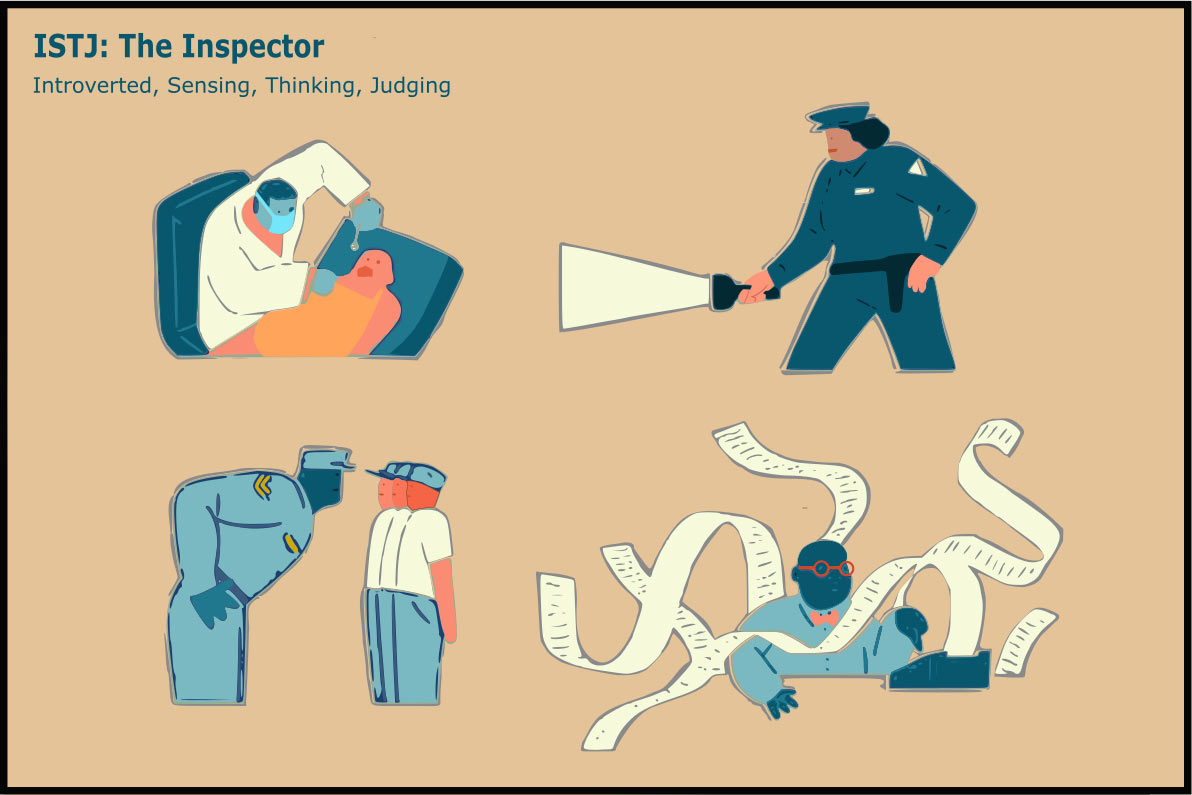
Major discussions on MBTI personality in workplace
Is It Possible to Have Dual MBTI personality types?
Unfortunately, the answer is not so easy. Let’s look at an example. Suppose that all of the lights in your apartment go out at once, putting you in full darkness. You might be able to find your way to the entrance, but what senses do you use? Touch? Hearing? Smell? It would be anything but your preferred sense, eyesight. However, as soon as the lights are turned back on, you will return to using eyesight because it is much easier to maneuver around the flat. Your personality functions in a similar way. The environment you’re in affects an effect your personality, driving you to adopt behaviors and habits that are out of character for your personality type.
Benefits of Having Dual MBTI Personality
This makes sense to me people have multiple personality types since humans are complex beings with varied personalities. We are not one-dimensional, static personalities; rather, we each have a variety of faces, emotions, actions, roles, beliefs, and other characteristics that combine to make us who we are.
I try to do the MBTI test several times and I have consistently only gotten the result of either an ISTJ “Mediator” or an ISFJ “Advocate”. When reading about both personality types, they both most definitely match and describe various parts of my personality, behaviors, and interests shockingly accurately. In my opinion, all people have specific personal preferences and I can accept that I have two personality types according to the MBTI test.
Benefits of Having Dual MBTI Personality in Workplace
According to the above explanations, now we can understand the importance of having different MBTI personality types in our workplace. Now consider that a company hires a person for a particular position. Now, if that person is one of the persons who have dual MBTI personality types. In practice, the corporation pays maybe a bit more for one but achieved the benefits and potential of having two employees and also both perspectives.
Conclusion
To conclude, totally MBTI personality test is not a ‘pass’ or ‘fail’ exam; there are no ‘good’ or ‘bad’ personalities; but, every one of us has our uniqueness and ways of doing things, and we all have something to offer. You can discover a lot more about yourself as an individual by knowing about yourself; Such as why some things come more effortlessly to you than others, where your strengths are, and where you might struggle.
Eventually, everyone prefers to be the best while there is no best for this. But a manager or a human resources manager can make their best choice whit more benefits for their workplace. It is a bit hard to find and have a person with a dual MBTI personality. But it is worse to look for it, pay the price and finally enjoy its benefits!
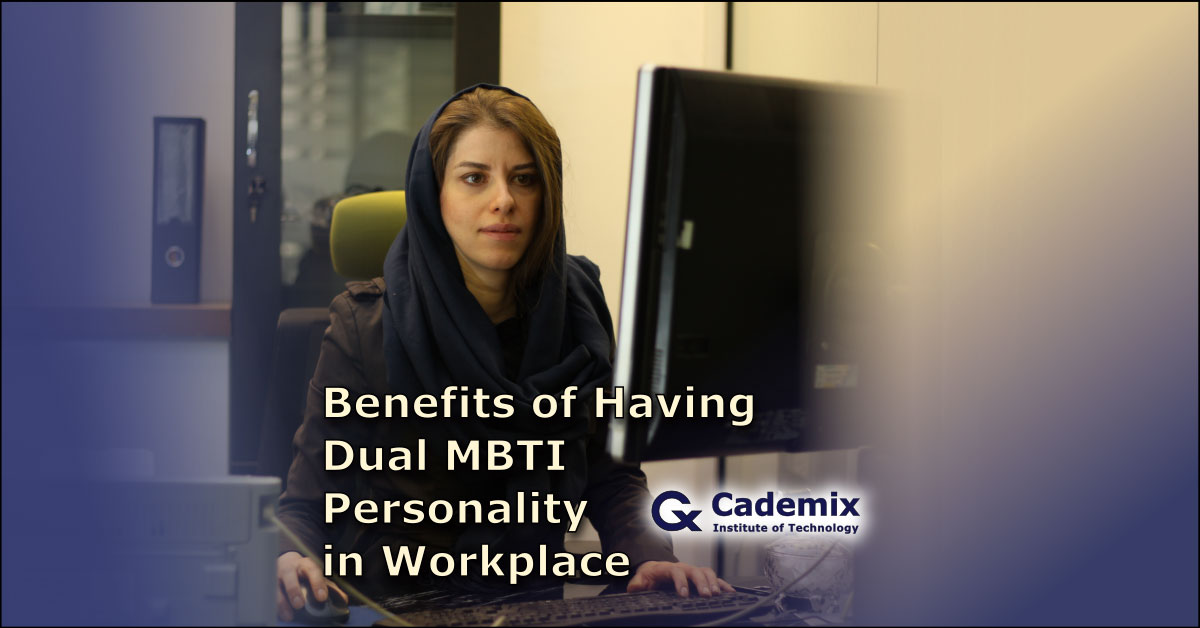
About the Author
Samareh Ghaem Maghami is an Associate Technical and Interior Designer at Cademix Institute of Technology, Austria with a bachelor of Fine Art from the University of Science and Culture of Tehran Iran. experienced in event planning and event managing as the designer and executor for the past 3 years. Self-employed for about 12 years experience as an executor manager. Also interior designer and expert in 3D modeling and architectural programs. Her first article was about Storyboarding in UI/UX: Roles and How to Do It. In addition to the above, she has dual personality types as an ISTJ and ISFJ and uses the benefits of each personality type in her daily life and workplace. Moreover, she is a member of the Cademix Career Autopilot Program. She is available for new opportunities. Please feel free to contact her.
E-mails:
sam.gh.maghami@gmail.com
Linkedin:https://www.linkedin.com/in/samareh-ghaem-maghami
Keyword related to MBTI personality in workplace
Introverted, Psychologist, Personality traits, Extrovert, Psychological types, Extravert, Personality tests, Briggs Myers, Extroverted, Extroversion, Inner world, Isabel Briggs Myers, Typology, Free personality, Temperaments, Spontaneous, Big-five, Dichotomies, Personality assessment, Sociable, Myers Briggs personality, Social situations, Making decisions. And also Myers Briggs test, Introverted sensing, Type theory, Briggs personality test, Validity, Introverted feeling, Personality testing, Typological, Idealist, Myers-Briggs personality types, Thinker, Extraverted feeling, Personality theory, Interpreting, Action-oriented, Auxiliary, Intj personality, Auxiliary, Jungian, MBTI types, Perceptive, Adaptable, Psychometric, Practitioner, Minded, Rational, Strengths and weaknesses, Dichotomy, Know your personality, ISTJ, ISFJ.

